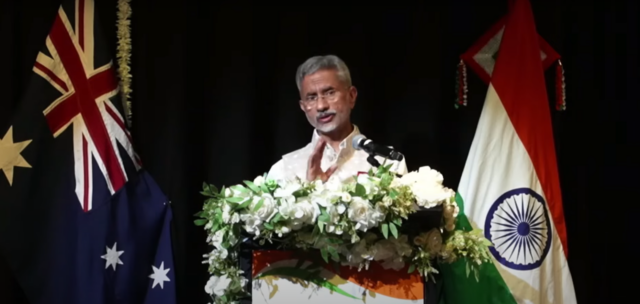At Australia’s Indian Ocean city of Perth, External Affairs Minister Jaishankar told a diaspora audience that the Indian Ocean conference over the last two days had helped by bringing focus on the Indian Ocean and the India relationship.
“This is my fifth visit to Australia as foreign minister, an average of one visit a year, not sure how many foreign ministers can say that,” he said, and gave a broad hint.
“It is reflective of the great change taking place before us in our relationship, the changes began 10 years ago when Narendra Modi became prime minister and he personally initiated an outreach to Australia. At that time, Tony Abbot was prime minister and in those 10 years, Modi has been prime minister for two terms so far, in both terms he has been here, so you should be prepared for a third visit, good point!”
He said there was “new energy, new interest in our relationship”, and contrasted it with how things used to be when it was “rare in one generation to see a high-level visit”.
He described the relationship with Australia as “the most consequent relationship we have in the Indian Ocean… if all goes well you will keep seeing me coming to Australia.”
Bilateral trade today is over $20 billion and growing steadily, and an economic cooperation agreement has given it a boost. The Indian diaspora has grown as has the diplomatic presence of either country.
“Or defence and security… today we and the Australian defence forces work closely as partners, do exercises together, allow deployment in either country and provide support to each other.”
India’s expanding footprint “has brought us into this region… if one looks at the Pacific islands close to Australia, there is today an Indian presence or project or collaboration in some form and Modi has committed to working with them in space, health and education.”
From CM to PM the country took Modi on trust in the hope that what he had done in Gujarat, good governance, he would be able to take it to a national level, he said.
Jaishankar asked the audience to reflect on the fact that today, India is regularly able to feed a population the size of Europe and North America, give free health care to more people than those who live in Europe, give houses to people greater than the population in Japan, and give gas cylinders to women equivalent to the population of Germany.
“I keep coming back to this because there is huge interest in this in the world. The next 25 years will profoundly transform India and by 2047 it would be realistic for India to be a developed country.”
Thirty eight years in journalism, widely travelled, history buff with a preference for Old Monk Rum. Current interest/focus spans China, Technology and Trade. Recent reads: Steven Colls Directorate S and Alexander Frater's Chasing the Monsoon. Netflix/Prime video junkie. Loves animal videos on Facebook. Reluctant tweeter.





